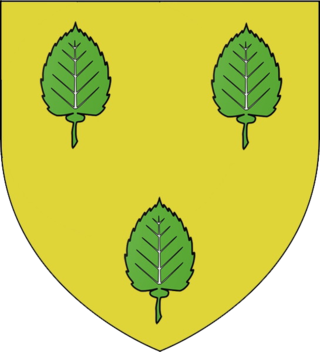Heaney is a surname of Irish origin. It is an Anglicisation of the Gaelic Ó hEignigh, thought to be based on the Gaelic Eochaidh a personal name meaning "horseman". It was mistakenly thought to derive from Éan, Gaelic for Bird. Versions of it are written in the Annals from the 8th century and has a diverse array of modern derivations and origins.
Mulholland or Mullholland is a surname. It is the anglicized form of Irish: Ó Maolchalann, lit. '"descendant of Maolchalann", a personal name meaning "chief of the calends"'.
Molloy or O'Molloy is an Irish surname, anglicised from Ó Maolmhuaidh, maolmhuadh meaning 'Proud Chieftain'. They were part of the southern Uí Néill, the southern branch of the large tribal grouping claiming descent from Niall of the Nine Hostages, the fifth-century king who supposedly kidnapped St Patrick to Ireland. They held power over a large part of what is now County Offaly, where the surname is still very common. A second family were the O Maoil Aodha, 'descendant of the devotee of (St) Aodh', from maol, literally 'bald', a reference to the distinctive tonsure sported by early Irish monks. As well as Molloy, this surname has also been anglicised as Mulloy, Malloy, Maloy, 'Miley' and 'Millea'. The name arose in east Connacht, in the Roscommon/east Galway region, and remains numerous there today.
Dennehy is a surname of Irish origin. The original form in Irish is Ó Duineachdha, meaning descendant of Duineachaidh, who was a chieftain who fought the Danes in Limerick in 934. The name may mean "humane", or may mean "man from the fairy hills". Spelling variations include Denehy, Dennehey, Denehey, Danahy, Deniehy, and Denahy.

O'Cleary or O'Clery is the surname of a Gaelic Irish family. It is one of the oldest recorded surnames in Europe
McArdle or MacArdle is an Irish surname. It originates in County Monaghan, where it was the fifth most common surname in 1970. The surname in Irish is MacArdghail, from ardghal, meaning 'high valour' or from the Irish "ardghail" meaning "tall foreigner" with roots "ard" meaning "tall" and "gail" meaning "foreigner", indicative of their original ancestor being a Viking or from Viking stock. The surname is also common in County Armagh and County Louth.
Considine is an Irish surname anglicised from the Gaelic form Mac Consaidín meaning "son of Consaidín" being derived from a foreign Christian name; meaning "son of Constantine". According to historian C. Thomas Cairney, the MacConsidines were one of the chiefly families of the Dal gCais or Dalcassians who were a tribe of the Erainn who were the second wave of Celts to settle in Ireland between about 500 and 100 BC. The family were based in Kingdom of Thomond, much of which later became County Clare. The ancestor of the family was Consaidín Ua Briain, a Bishop of Killaloe who died in 1194 and who was the son of Toirdhealbhach mac Diarmada Ua Briain. Notable people with the surname include:
Kielty is a surname. Notable people with the surname include:
The surname Monaghan is a family name originating from the province of Connacht in Ireland. Mostly a last name.
Hanratty is a surname, and may refer to:
O'Boyle is a surname of Irish origin. It is anglicised from the Gaelic Ó Baoighill/Ó Baoill.
Mullally, Mulally, Mullaly or Mulaly are anglicized variants of the Irish language surname Ó Maolalaidh thought to have originated from County Galway where it has since been shortened to the form of Lally.
Durkin, together with Durcan and Durkan, is the anglicised form of the Irish surnames Ó Duarcáin or Mac Duarcáin. Notable people who spell the surname Durkin include:
Muldowney is an Irish surname. Notable people with the surname include:
McMenamin is an Irish surname. In Gaelic it is rendered, Mac Meanman, meaning 'son of Meanma' a name meaning courageous or high spirited. It originated in County Donegal in the 13th century. The first written mention of the name is in 1303 in the 'Annals of Loch Cé' which records the deaths of Donnchadh Mac Meanman and Aedh Mac Meanman, grandsons of the Lector O'Domnhaill, the chieftain of Fanad, during a dynastic struggle within the Cenél Conaill. The McMenamins are a branch of the O'Donnells of Tyrconnell (Donegal) and are part of the Sil Lugdach, descendants of Lugaid mac Sétnai, the great-grandson of Conall Gulban. Like many discarded branches of noble families, the McMenamins sought advancement in the church evidenced by numerous mentions of McMenamin prelates in papal letters from the late 1300s to the late 1400s. They were supplanted in their home territory of Fanad by the Sweeneys and over the centuries became more distantly related to the royal line of the Cenél Conaill. One scholar describes the family as "...a discarded branch of the O'Donnell dynasty"
The surname O'Loughlin is an Anglicised form of the Irish Ó Lochlainn meaning "descendant of Lochlann". According to historian C. Thomas Cairney, the O'Loughlins were a chiefly family of the Corco Modhruadh tribe who in turn came from the Erainn tribe who were the second wave of Celts to settle in Ireland from about 500 to 100 BC.
Holohan is a surname of Irish Gaelic origin, from the Irish uallach meaning "proud".
Faherty is an Irish surname that may refer to
Karney is an Irish surname. Notable people with the surname include:
This page is based on this
Wikipedia article Text is available under the
CC BY-SA 4.0 license; additional terms may apply.
Images, videos and audio are available under their respective licenses.
